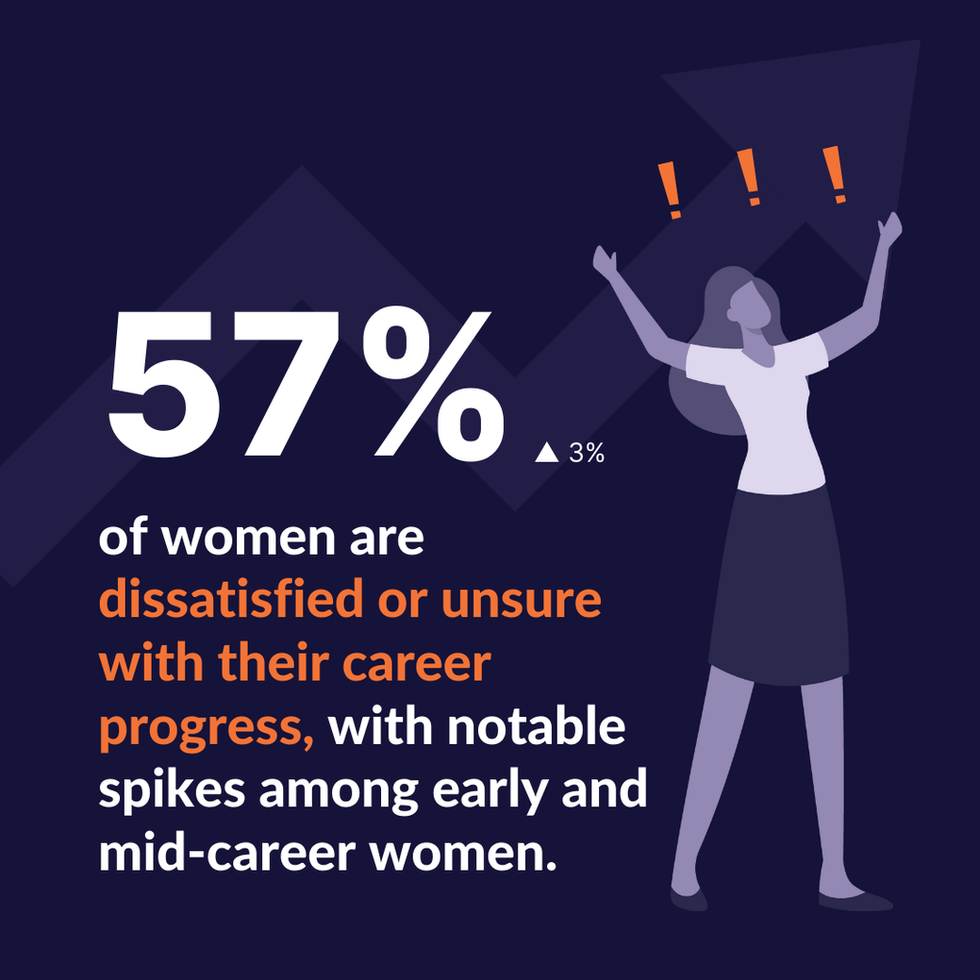Career Dissatisfaction for Women in Media is at Record Highs, New Research Finds
- Jun 9, 2024
- 3 min read
Updated: Jul 1, 2024
Financial pressures, limited promotional opportunities and an increasing fear of redundancy are driving women to consider quitting.
The latest research reveals a growing dissatisfaction among women in the media industry, driven by concerns about pay and a lack of promotional opportunities. The Women in Media Industry Insight Report 2024, released today, indicates that a majority of women (57%) are unsure or explicitly dissatisfied with their career progress, and more than one-third are contemplating leaving their jobs.
“Increased levels of anxiety and dissatisfaction are alarmingly evident in this year’s Women in Media Industry Insight Report 2024,” said Petra Buchanan, strategic advisor to Women in Media.
“Career aspirations are being overshadowed by concerns about pay inequity and a lack of advancement opportunities.”
She added, “The financial pressure, being felt across various sectors of the economy currently, is starkly reflected in these findings, with inadequate remuneration topping the list of grievances. Increasingly, senior and mid-career women are considering quitting their jobs driven by worry about the availability of senior roles and increased fear of redundancy. The report highlights recommendations for employers to address inequalities women face in the media industry.”
Key findings from the Women in Media Industry Insight Report 2024:
Career Progress Concerns: 57% (▲3%) of women are dissatisfied or unsure with their career progress, with notable spikes among early and mid-career women:
49% (▲11%) of women with 5-10 years of experience said they are not progressing as desired.
47% (▲23%) of early-career women are dissatisfied.
Over one-third attribute their dissatisfaction to a lack of opportunities.
Intent to Leave: 35% (▲6%) of women are considering quitting their jobs, particularly senior and mid-career professionals.
Perception of Gender Equality: 56% (▲3%) hold a negative view of the media industry's commitment to gender equality.
Pay Concerns: 58% (▲11%) are concerned about better pay.
Desire for better pay outpaced other motivations both as reasons to stay (▲8%) and leave (▲3%) current roles. This disconnect suggests that, for some, salaries are not meeting their current expectations or their cost of living, making higher pay more of an urgent/short-term necessity than a future/ long-term aspiration.
Promotion and Redundancy Fears: 58% (▲15%) worry about the availability of senior roles, while 47% (▲9%) are concerned about limited promotional opportunities and 25% (▲10%) fear being made redundant.
Support and Resources: 27% believe being engaged or challenged in a positive way is crucial to their career progress, however 48% (▲2%) are concerned about the impact of budget cuts and a lack of resources.
Call for Gender Pay Audits: 69% of respondents advocate for gender pay audits to address the media industry’s gender pay gap.
Skill Development Needs: 46% prioritise learning artificial intelligence, followed by podcasting and digital technology. Two-thirds of the women surveyed are positive about using AI, primarily for research and content creation.
Research author and strategic advisor to Women in Media Petra Buchanan emphasised the urgency for employers to address entrenched issues impacting the careers of women in the media workforce.
“These results underscore the critical and urgent need for industry-wide systemic change, starting with a firm commitment to gender equality and addressing the above-average gender pay gap.* This change must include providing fair compensation, ample growth opportunities, and a safe, supportive work environment so that women remain in the media and transition into leadership positions,”
said Buchanan.
Recommendations For Employers:
Women in Media urges media employers to prioritise the following to support women’s career advancement:
Commitment to Gender Equality: Enhance transparency and commitment to gender equality in the workplace, including pay.
Clear Pathways to Promotion: Define and communicate career opportunities to aid women’s progression.
Access to Upskilling: Focus on providing training in AI, podcasting, and digital technology.
Managerial Support: Foster an environment where women feel engaged and positively challenged.
Women in Media is committed to driving ongoing discussions and initiatives to support women in the Australian media industry.
*ABS data (November 2023) states a 9% average weekly earnings pay gap for women in the Information Media & Telecommunications Industry ($409.40 less per week than men). The average Australian weekly earnings gender pay gap is 7%.



















